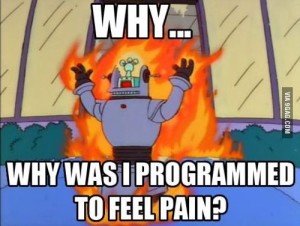Hello dear readers! Given that my beloved followers are my one source for unloading the insanity that comes with being a workers’ comp defense attorney, I thought I’d take this opportunity to share a dream I had recently. Now, now, you’ve already started reading, your coffee is still cooling, don’t go anywhere!
In my dream, everywhere I went, jobs and labor were replaced with machines. This is the pre-Skynet stage, so all the robots were still friendly. Job after job after job was done by machine, and the few human jobs left were focused on designing, maintaining, and supervising the machines. There were no work injuries (coincidentally, I was out of a job).
I woke up in a cold sweat – but who would pay for doctors’ vacation homes and applicant attorneys’ Teslas?
I bring you then, the news fresh out of China (like just about everything on store shelves these days), that one factory has replaced 600 employees with robots, resulting in a workforce of 60, but, as a result, has tripled production and seen a reduction in defective products from 25% to 5%.
China and her Asian neighbors are often destinations for production because of a variety of reasons – among them, cheap labor. In years past, Apple has been accused of running practical slave labor camps for the production of its products.
Now, your humble blogger just has to ask the question – if a country with a ridiculously low-cost of labor finds enough economic incentive to mechanize its work force, why wouldn’t a country (or even a state, hint hint) find a similar financial incentive? Why go through labor disputes, workers’ compensation claims and insurance, and human error when machines could be working round the clock? Why not limit your employees to highly educated and/or skilled employees who would be such high earners that attempting to defraud the workers’ compensation system would result in a net loss even if successful?
Here’s another question for you – California is a hotbed of conflict between new technology and old laws. Regulation governing the day-to-day of the Flintstones is difficult to apply to the world of the Jetsons.
Going forward, how should California’s workers’ compensation laws adjust to be better suited to an increasingly high-tech and robot-based industry? As awesome as it would be to depose a robot, I’m thinking more along the lines that laws focused on heavy manual labor, with resulting injuries and needs of human workers might gradually become less and less relevant.
What do you think, dear readers? Should we all enjoy the beach while the robots work and litigate their own injuries?
Have a great weekend!


